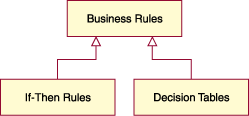IBM BPM, V8.0.1, All platforms > Authoring services in Integration Designer > Get started with IBM Integration Designer > SCA > Service implementation types
Business rules
Business rules complement business processes and state machines. If there is condition with a variable, for example, you can use a business rule to change the value in that variable at run time.
If there is condition with a variable, for example, a business rule can change the value in that variable at run time. Created by a visual programming language, a business rule makes a decision based on context. The decision can be simple or complex. Business rules are nonprocedural and the rules can be changed independently of an application.Business rules determine the outcome of a process based on a context.
Business rules are used in everyday business situations to make a decision given a specific set of circumstances. This decision may require many rules to cover all the circumstances. Business rules within a business process allow applications to respond quickly to changing business conditions. In an insurance corporation, for example, a business rule for approving car insurance to an applicant could be: If the applicant is male and over 25 years old, and the car category is sports, and he has been insured with us for the past 5 years, then approve the application for insurance at a fee of $100 per month.
You can use several different approaches when you create business rules. You can create if-then rules or decision tables, all of which will shape the outcome of your process. If that these rules are independent of the process itself, meaning that you can change the rules at any time without having to redo your process.
For example, based on where your business is located, you might have a rule that says: If the date is between December 26th and January 1st, then offer a post-holiday sale discount of 20%. However, if sales continue to be too slow, you could at any time modify the discount to 40%.

Business rules cannot be used in a mediation module.
Related concepts:
Java objects
BPEL process
State machines
Selectors
Human tasks
Mediation flows
Stand-alone references